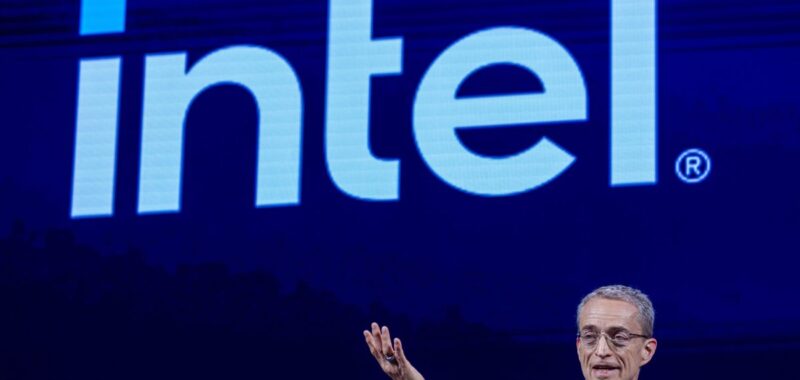
Good morning. It can be difficult to turn around a company after years of missteps—take Boeing for example. But the challenge can be even greater for a big tech company, like Intel, that has lost its dominance in this wave of fast-paced AI.
In a new article, my colleague Jeremy Kahn, Fortune‘s AI Editor, explores how Intel’s CEO Pat Gelsinger is betting the company on 18A, a new chipmaking process. Gelsinger hopes it will position Intel as a viable alternative to Taiwan Semiconductor Manufacturing Co., the world’s leading contract manufacturer of chips.
To carry out this plan, Intel is investing nearly $30 billion for the construction of two state-of-the-art semiconductor plants, or fabs, in Chandler, Ariz., outside Phoenix, that will be the first to use the company’s newest chipmaking process. “It’s here, in Chandler, where Gelsinger’s fate—and likely that of the company he leads—will be decided,” according to Kahn.
Intel, now struggling, was once dominant in its core business for central processing units (CPUs). But rival AMD now has significant market share. Then Intel failed to see the extent to which graphics chips would come to dominate the market for AI. This would prove a colossal blunder as it didn’t take long for Nvidia, which took the graphics processing unit used for video games and turned it into the workhorse for training and running AI models, to dominate the new field.
Kahn puts it this way: “Gelsinger is racing to reverse Intel’s slide by repositioning the company around manufacturing excellence, while also trying to establish Intel as a player in the market for AI chips. Many are skeptical he can pull it off and fear the company may be in permanent decline.” (You can read Kahn’s full deep dive here).
As Intel tries to pull off a turnaround, it is also cutting its workforce by 15%, which translates to roughly 15,000 jobs, and projected savings of $10 billion in 2025. “Our revenues have not grown as expected – and we’ve yet to fully benefit from powerful trends, like AI. Our costs are too high, our margins are too low,” Gelsinger wrote in a memo to employees in August.
During the Citi Global Technology conference last month, Intel CFO David Zinsner said the company is currently in talks with 12 potential customers for its 18A chip manufacturing business, adding that 2027 is the year “where we’ll see some meaningful revenue from that set of customers.”
For the 56-year-old company, which fell 17 spots in the Fortune 500 this year, the bet on 18A looks like an expensive gamble—but one that Intel can’t afford to not take.
Sheryl Estrada
sheryl.estrada@fortune.com
The following sections of CFO Daily were curated by Greg McKenna
Leaderboard
Brian Scott will resign from restaurant company Jack in the Box (Nasdaq: JACK), known for its namesake hamburger chain and Mexican-American chain Del Taco, effective Nov. 20. He is leaving to accept a new position outside the restaurant industry, the company said. Dawn Hooper, a 24-year veteran of Jack in the Box, will assume the role of principal financial officer and interim CFO, a position she has held previously.
William J. Skrobacz will step down from his role as vice president and CFO of NewMarket (NYSE: NEU), a global conglomerate in the petroleum and aerospace industries, effective Dec. 31. He intends to retire in 2025 after joining NewMarket over 13 years ago, the company said. He will be succeeded by Timothy K. Fitzgerald, who joined the company roughly 10 years ago and was appointed treasurer and finance director in January.
Big Deal
A tentative deal to end the strike of roughly 50,000 members of the International Longshoremen’s Association means crucial ports from Maine to Texas reopened on Friday. The brief strike, however, underlined how such events can disrupt American businesses and the wider economy.
Almost 90% of executives say securing their supply chains against “black-swan” events is a top priority, according to a recent report from industrial REIT Prologis. The survey, conducted by The Harris Poll, polled over 1,000 executives from the U.S., U.K. and Germany.
Only about 40% of respondents said they felt adequately prepared to deal with potential disruptions such as cyberattacks and regulatory changes, with even fewer feeling ready to cope with trade wars (36%) or global pandemics (35%).
Going deeper
“How Proposed SEC Disclosure Requirements Could Help Workers,” is a new report from the Harvard Business Review. The Securities and Exchange Commission is debating whether to require new disclosures about human capital management, or working conditions inside a firm. While these rules would be focused on serving investors, they could also help workers move to more employee-friendly firms or negotiate more benefits, writes Lisa LaViers, an assistant professor of accounting at Tulane University’s A.B. Freeman School of Business.
Overheard
“There is enormous potential for both Chrysler and Dodge to succeed, but it requires listening to their customer base and focusing on what made these brands iconic. Instead, Stellantis continues to push overpriced products into a high-interest-rate market, with questionable build quality stemming from its outsourcing practices. American buyers especially crave American-designed and built products, but this is something Stellantis appears to overlook. ”
—Frank B. Rhodes Jr., the great-grandson of Chrysler founder Walter P. Chrysler, wrote in a Fortune opinion piece about why he believes Chrysler and Dodge must be returned to American hands.

